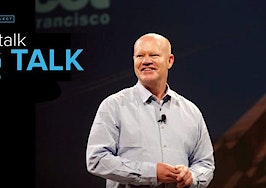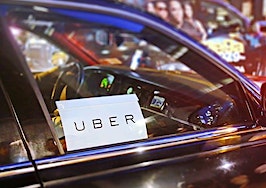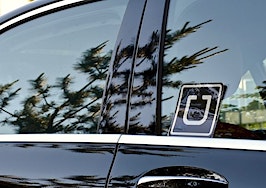- Driverless vehicles and rideshare services will change real estate development and urban planning.
- But you'll have to pry many people's keys from their cold, dead hands.
Many of you probably live two separate lives, as I do. When traveling to real estate conferences, it’s upscale venues, fine food, plentiful drinks and Uber at your fingertips.
On a whim, you can move quickly and seamlessly to new locations. It feels exhilarating to live untethered. You don’t want your car slowing you down.
In this life, I’m willing to humor the notion that a millennial will sell her vehicle and turn her garage into an Airbnb. She’ll list her home with a salaried Compass agent and find a buyer (who happens to be a Chinese national paying in Bitcoin) through an Uber grad’s new bidding war platform. Of course, a secure blockchain app closes the transaction.
Then I get home. Agents need a meeting. Clients want a showing. The wife needs me to pick some things up at the store and then immediately go back because I forgot something. Get in the car.
Oh yes, the children — they need to be shuttled to school, piano, cross country, soccer, choir, Scouts and camp. I need a vehicle that can house a varying number of small humans, secured in seats that must constantly be resized based on new government mandates and their bodily growth.
A shape-shifting, always-available, driverless minivan might be an option in 2050, but let’s be honest: It’s going to be a lot more expensive than the Honda Odyssey.
The crushed Cheetos of daily life
I’d love to have a driverless vehicle at my beck and call. I’ve lived through hellish commutes in Los Angeles, San Francisco and Seattle.
But who would want to share it with me? Have you seen what children do to cars?
Maybe there’s a specialty service in the future that caters to those who like to sit on crushed Cheetos and used Band-Aids. I won’t hold my breath.
(“I’m going to pull this Uber over if you kids don’t stop fighting! I’m serious this time! Siri, pull this car over right now!”)
Brad Inman’s piece last week discussed how transportation technology will change real estate. Rideshare services and driverless vehicles will have a significant effect on the way neighborhoods and urban environments are designed.
But will these innovations will actually change people’s desire to own a vehicle on a large scale?
When I hear Silicon Valley heads talking about the imminent growth of driverless cars and the death of the residential garage, I think they’re not only willfully ignoring the Average Joe’s lifestyle, they also don’t visit small towns very often.
They don’t spend time in the two-thirds of American geography, where traffic isn’t much of a problem. Many people really like to drive, and they like owning their vehicles.
They don’t want to wait for their driver to find them. They just want to get in and go.
Right or wrong, many people (particularly Americans) seem to flinch at this collaborative consumption ideology. You can pry their keys from their cold, dead hands.
In one of my lives, I am part of that group.
3 minutes of free time
Let’s talk about change that is already happening, though.
On Sunday afternoon we were taking the kids to the bowling alley across town. I already know two routes to get there.
I pulled up Google maps anyway, and it took me down a new route.
The alternate path saved me three minutes.
I wasn’t in a rush. If it wasn’t going to cost me anything, though, why would I spend three more minutes in traffic?
Digital routing has become a mundane part of our daily routine. Time is our most precious resource, and the seer that lives inside our traffic app saves it for us without financial cost. We’re literally handed free time, and we take it for granted.
There’s an interesting side effect. We drive on roads that municipalities and urban planners never thought we would traverse. Hordes of vehicles unpredictably and suddenly fill side streets in unprepared towns as they reroute around blockages on major thoroughfares.
Technically, this is progress (in terms of efficiency), but some communities are not prepared for the changes. They have to manage a new transportation reality due to the average driver’s greater informational leverage.
We’re not just talking about small towns. West Bellevue, Washington, is home to Bill Gates and much of the Seattle tech elite. The folks who live here would prefer their neighborhoods to be traffic-free, and they traditionally have been.
Increasingly, though, we see longer backups through these quiet neighborhoods as freeway traffic nearby slows. Locals have always known that they can shortcut through Clyde Hill, about two miles east of Seattle.
Now, more drivers who know nothing about the area are following their digital devices off the freeway and through these nearby luxury enclaves in their quest to save those minutes. They’re not even making a decision — they’re just following instructions.
The challenge of an unclear transportation future
Smart growth planning will become critical as cities weigh the impacts of these transportation changes. Communities that want to be spared from diverted long-distance travel traffic will have to be designed in a way that logistically and systematically prevents it.
Building a cute, historic-storefront Main Street won’t discourage the driverless vehicle or Uber from commuting through.
Physical impediments to the throughput of traffic (such as enforcing a permanent slowdown that creates a negative alternative to a gridlocked thoroughfare) will be a necessary strategy in some situations.
Imagine trying to plan a 30-year design for a town when we don’t know what the vehicles will look like in 10 years. It’s going to take some very talented people to get smart growth planning right in the near future.
I look forward to my next foray into my alter-ego conference life. I’m sure there’s a driverless car in Inman Connect’s near future.
I’ll be the first to sign up for a ride. Hold the Cheetos.
Sam DeBord is managing broker of Seattle Homes Group with Coldwell Banker Danforth and President-Elect of Seattle King County Realtors. You can find his team at SeattleHome.com and SeattleCondo.com.












